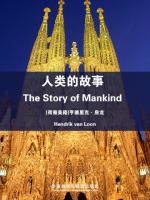The story of mankind
From the origins of mankind to the incisive exposition of each historical period, the brilliant reenactment of historical scenes and the brief commentary on historical figures, Fan Long casts a clear eye on the history of mankind with a deep humanistic concern. As Fang Long himself says: "I wrote this book on one principle: which country or individual produced a new idea or accomplished an innovation without which the whole history of humanity would be different. It is not a matter of personal predilection; it is a matter of judgement so dispassionate as to be almost mathematical."
The story of human history is divided into three broad phases: the first is the early stages of human civilization, with the book focusing on a few important peoples, the Sumerians, the ancient Indo-Europeans and the Greeks; in the second, the development of human civilization enters a phase centred on religion, dominated by the confrontation between Christianity and Islam; in the third, the theme of change replaces religion as the recent main line. Running through these three stages is the spirit of human enterprise that has been present since the beginning of time.
I. The various peoples of early human civilisation represent the characteristics of early human development. The first people to be introduced are the Sumerians, who created the earliest known civilisation of mankind, and who wrote the first writing in human history, known to us as cuneiform, using reed sticks pressed into mud and stone tablets. This was their greatest contribution to mankind. The second people are the ancient Indo-Europeans who lived on the plains of Eastern Europe and who represent the early human migrations. One group of the ancient Indo-Europeans migrated westwards through what is now the Middle East and continued southwards, eventually landing in India, where they became the ancestors of the Indians. The other group remained in Europe, either migrating west or developing south to become the ancestors of modern Europeans. Finally, Fan Long introduces a family of ancient Greeks in great detail. The author paints a meticulous picture of the family's simple daily life and their pursuit of spiritual development, using a specific family to show the spirituality of the Greeks as a whole.
Secondly, human civilisation reached an important stage in its development with the theme of religion, mainly dealing with the development and opposition of Christianity and Islam. Christianity, which originated in Rome, gradually developed and flourished on the European continent, and by the Middle Ages a great religious unity was formed in Europe. Islam originated in the Arabian Peninsula and subsequently expanded into North Africa and Central Asia. As each grew, the influence of Christianity and Islam expanded, and believers of different faiths finally met in Jerusalem and the surrounding areas. From the 11th century onwards, crusaders formed by Christians, led by the Church, began a two-century-long conquest of the East, with the main task being to compete with Islam for land and followers. However, Islamic teachings boosted the fighting ability of Muslim armies through regulations that favoured inspiring soldiers, making them a formidable force that defeated Christians in places such as Spain.
III. The Age of Change that came with a bang focuses on the Renaissance, the Reformation, the Enlightenment and the French Revolution. The Renaissance, one of the signs of the end of the Middle Ages, focuses on the concern for the emotions of man himself, born of love, in Dante's work. This concern for the human person was called humanism by later generations. Humanists encouraged the people to focus on their own needs and attacked the hypocritical preaching and corruption of the Church in disguise, ideas that paved the way for the Reformation that followed. Martin Luther, the leader of the Reformation, built on humanism by critiquing the content of religion and suggesting that faith was the only measure of the believer. Many of his recommendations were put into practice, updating religious doctrines and rituals and further liberating people from the rule of the Church. By the time of the Enlightenment, the rationality in human thought was further tapped and philosophers, represented by Voltaire, turned the tables on secular royalty and fought for more power for the people. This spiritual inspiration drove the French Revolution.
After this, economic, technological and social changes accelerated, the age of the machine took great strides, social organisations of all kinds began to emerge, and people's enthusiasm for science reached unprecedented levels. The story of humanity continues to be written forward, step by step, closer to the present day in which we live. Looking back on the whole story of mankind, this spirit of change was not only present in the French Revolution, but has been in the blood of mankind since time immemorial. When the Indo-Europeans abandoned their familiar homeland and took the first steps on the long road of migration, when Dante turned the pure love of his heart into a line of poetry, when Martin Luther raised his arms and attacked the corruption of the Church, the spirit of progress and advancement has always been present and will lead mankind to a better future.



 京公网安备 11010802032529号
京公网安备 11010802032529号